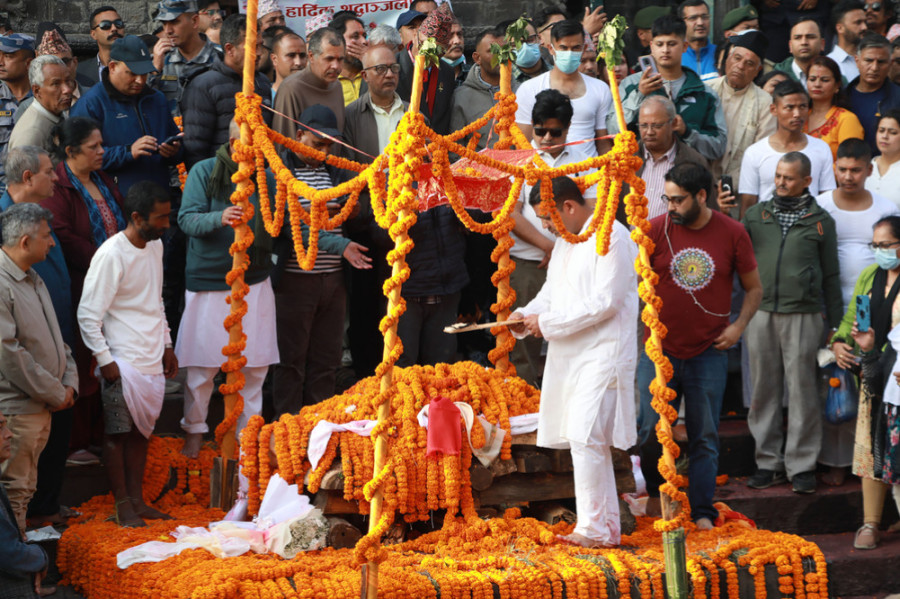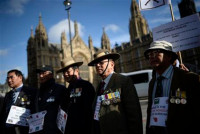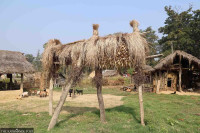National
Former Speaker Dhungana cremated with state honours at Pashupati Aryaghat
Prime minister, political leaders, ministers and people from various walks of life gather to pay tribute to him.
Post Report
Former Speaker Daman Nath Dhungana, who died on Sunday, was cremated with state honour at Pashupati Aryaghat on Monday as per the Hindu rituals.
His two sons–Nimesh and Nishesh–lit the funeral pyre as hundreds of people gathered at Aryaghat to pay him the last tribute.
A squad of Nepali Army gave him a guard of honour of 17-canon salute as per the government decision to accord a state funeral to the late Dhungana.
A Cabinet meeting in the morning also announced a public holiday on Monday to pay tribute to the veteran politician and ardent advocate of democracy and human rights, who served as the Speaker of the first parliament elected after the restoration of democracy in 1990.

In addition, all the government offices in Nepal and abroad were instructed to fly the national flag at half-mast.
Minister for Communication and Information Technology Prithvi Subba Gurung, who is also the government’s spokesperson, said the Cabinet meeting took the decision in respect to Dhungana’s contribution to the country.
Before cremation, the body was kept at Sano Gaucharan, where leaders, civil society members and people from various walks of life gathered to pay their respects to him.
Prime minister, deputy prime minister, Cabinet ministers, chiefs of various political parties, former prime ministers, his well-wishers and relatives reached Sano Gaucharan and Aryaghat.

Prime Minister KP Sharma Oli draped Dhungana’s body with the national flag. Oli praised Dhungana as a multifaceted leader whose impact on Nepal’s parliamentary practices remains profound.
“He was successful in leaving a significant imprint on our parliamentary system, and it is important that we follow the path he laid down to strengthen our democracy,” said the prime minister during his tribute.
Nepali Congress President Sher Bahadur Deuba, CPN (Maoist Centre) chair Pushpa Kamal Dahal, Deputy Prime Minister and Finance Minister Bishnu Paudel, Cabinet ministers, former prime ministers including Baburam Bhattarai and Jhalanath Khanal, among other politicians, paid their tributes.
Throughout his life, Dhungana maintained his distinct identity in Nepal’s political movements. Despite being affiliated to the Nepali Congress for a long time, he didn’t confine himself within the party’s domain. He earned immense respect from other political parties and communities fighting for their rights and identity.

He joined politics as a student activist in the 1960s against the partyless Panchayat system and later established himself as an advocate, human rights activist, civil society leader, and politician. He became general secretary of the Nepal Bar Association in 1971. Dhungana was also a founder executive member of Amnesty International. In 1990 he served as a member of the Constitution Recommendation Commission that drafted Nepal’s constitution.
He is respected by leaders from across the party for his exemplary role as Speaker for three years at the time when Nepali politicians and political parties were inexperienced about parliamentary practices.
He was also highly respected for the role he played as a civil society leader to mediate between mainstream political parties and the erstwhile rebel Maoists. He was one of the facilitators who worked to bring the then ruling parties and the then underground Maoist leaders together and sign the Comprehensive Peace Accord in 2006 that ended the decade-long Maoist insurgency in the country.




 13.16°C Kathmandu
13.16°C Kathmandu














